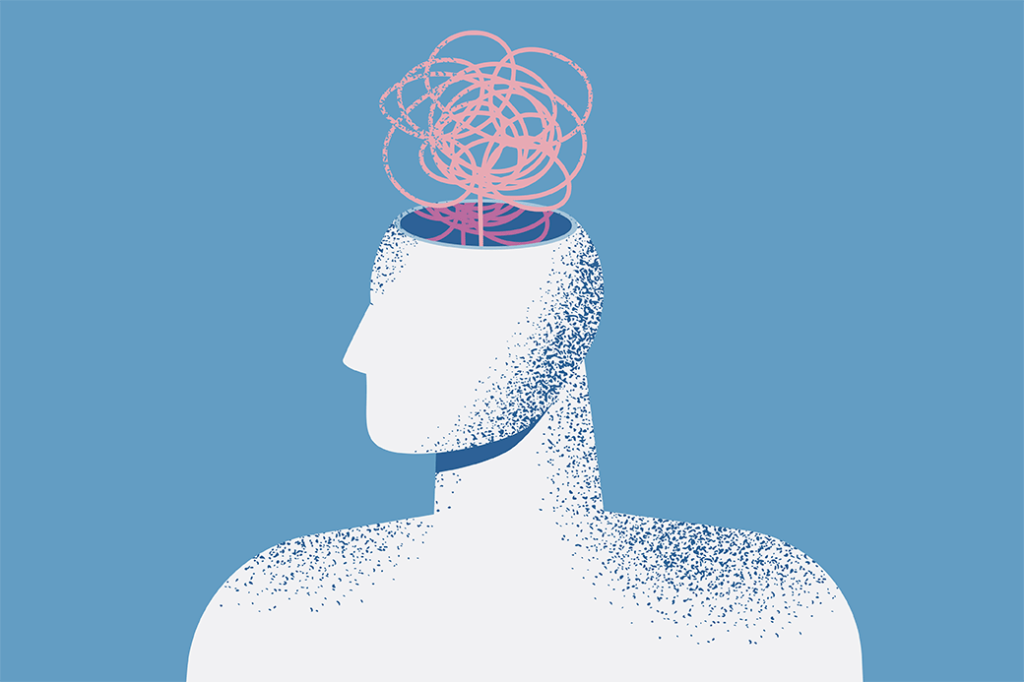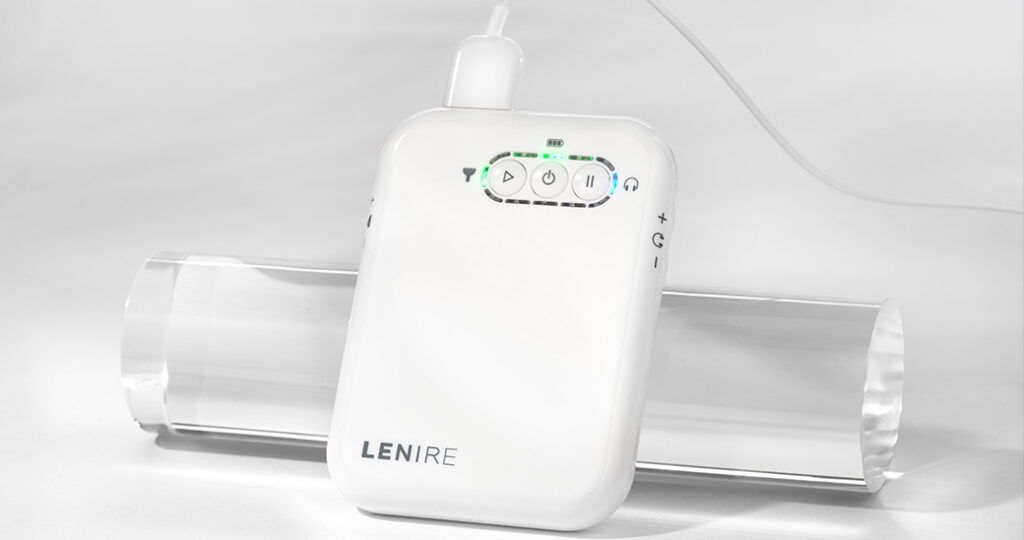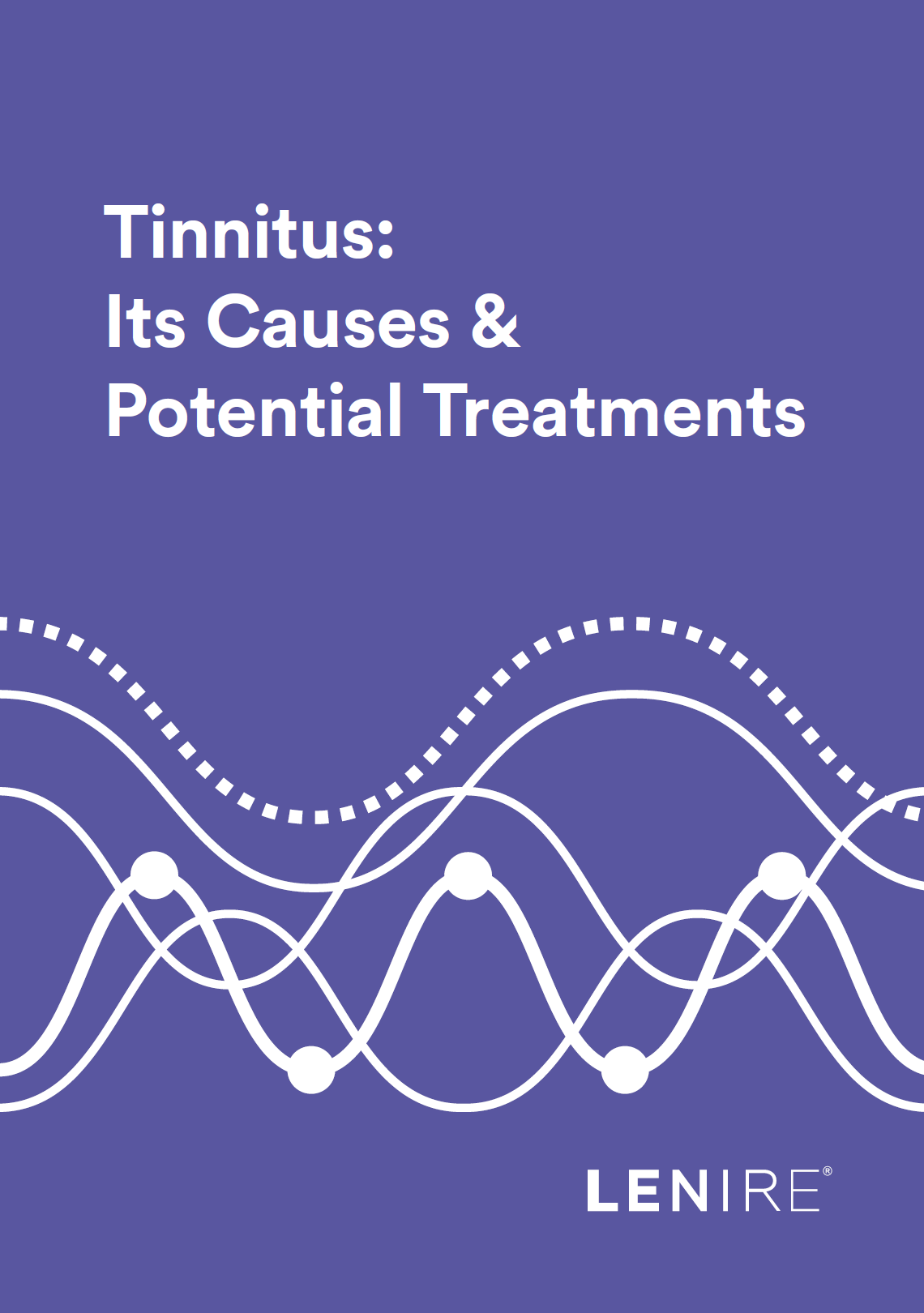Key Tinnitus Stats – You’re Not Alone
800m
800 million people are estimated to have tinnitus worldwide.
90%
90% of those with tinnitus have some form of hearing loss.
1
Dual mode treatment device granted approval by the US FDA – Lenire. 3

What is Tinnitus?
Tinnitus is when a person hears sound in their ears when there is no external source. The sound is often ringing, buzzing, hissing or thumping in the ears.
The condition affects 10-15% of the population. For many, it is short term but for others it can be an ongoing issue. It may present suddenly but can often build gradually.
Why is it Worse for Me?
Tinnitus is a complex condition. As a result, how it impacts different people varies greatly. Some people’s brain may fixate while others can ignore it.


How do you Measure Tinnitus?
A common measurement scale is Tinnitus Handicap Inventory (THI). On a scale of 1 – 100, a higher score means a bigger impact on quality of life. See how Lenire reduced THI score in clinical trials.
Are There Scientifically Proven Tinnitus Treatments?
Yes. Lenire has been proven in three large clinical trials. Lenire is CE-Marked in Europe and is the first and only device of it’s kind to receive FDA Approval in the United States.

Patient Stories
Tinnitus FAQs
-
What are the symptoms?
People’s experience of tinnitus differs greatly. Most commonly, you will hear it described as an annoying ringing in the ears. You will also hear it described as a buzzing, humming, hissing, or whistling sensation. It can be perceived as being in one or both ears, in the head or even outside the head in certain cases. For many, it’s a constant or fluctuating sound that they will hear all day long – even more so when it’s quiet (such as at night, when there is less external sound to dull it down) – but for others it may be something that comes and goes. Some sufferers will report hearing one single sound whilst others can hear a multitude of sounds. On top of all of these common variations, the sound itself can also vary in both pitch and loudness.
-
Who is affected?
Though not as widely discussed as some other health concerns, the reality is that around 10-15% of a population will experience bothersome tinnitus. To put that into context, if you take the latest population figures from the US (which, in 2019, was just over 328 million), that’s 32-49 million people who will live with tinnitus symptoms. People of all ages can get it; even children. Statistically though, it’s more common in adults as it is associated with hearing loss which is believed to increase with age.
Many people get tinnitus for a short period of time (‘acute tinnitus’ is tinnitus that lasts for a maximum of three months). It can manifest after being exposed to loud music, perhaps at a concert or via headphones, but it can also arise due to an excess in ear wax, or as a result of a cold or a flu. In a lot of these cases, it will pass, but for some, it doesn’t go away, and can be a chronic and bothersome issue.
-
What are the types of tinnitus?
Generally speaking, there are two types of tinnitus: Subjective Tinnitus and Objective Tinnitus.
Subjective Tinnitus is tinnitus that only the person themselves can hear. This is the most common type of tinnitus, encompassing any and all of the aforementioned symptoms.
Objective tinnitus is tinnitus that your GP can hear when they do an examination and put a stethoscope to the ear. This rare type of tinnitus may be caused by a blood vessel problem or ear muscle contractions.
Lenire is a bimodal neuromodulation treatment that focuses on Subjective Tinnitus; as such, we will refer only to Subjective Tinnitus below.
-
What are the causes of tinnitus?
Hearing loss, as a result of ageing, is the most common cause of tinnitus.
Other common causes include eardrum perforation, middle ear infection, Ménière’s Disease, sudden exposure to loud noise, certain medications, head injury, temporomandibular joint disorder (TMJ) and stress.
Less commonly, tinnitus is linked to hearing loss caused by a blockage or ear condition that affects the outer or middle ear and stops sound waves from passing into the inner ear.
-
What is neuroplasticity?
Neuroplasticity is the ability of the brain to change or rewire itself continuously throughout a person’s life by forming new networks and pathways. Neuroplasticity can be helpful (adaptive), such as our brain’s ability to learn a new language. It can also be unhelpful (maladaptive). For example, when our brain attempts to rewire itself as a result of damage due to hearing loss, which is believed to lead to tinnitus symptoms, this would be a maladaptive effect of neuroplasticity.
-
What do I do if I have tinnitus?
For a lot of people, identifying the specific cause of their tinnitus symptoms proves difficult.
For this reason, it’s important that patients experiencing tinnitus go and see their GP for a full examination in order to diagnose the underlying cause. In some cases, resolving the cause may alleviate the perception of tinnitus, such as an ear infection.
If the GP cannot find an underlying cause, patients may be referred to an ENT Consultant for further investigation. An MRI / CT scan may be carried out to further clarify the problem.
Patients may also be referred on to an audiologist to have their hearing assessed.
Audiologists who specialise in tinnitus can also explain to people the different types of treatments and management techniques available and highlight those which they deem as most suitable to a particular individual.
-
Is tinnitus a problem?
The majority of people who have tinnitus are not particularly bothered by it; they may find it only mildly annoying and ultimately learn to live with it. For some people, however, living with tinnitus can have a serious impact on their quality of life, triggering anxiety, stress, depression and interfering with hearing, sleep and concentration. Whether it’s mild or severe, the good news is that tinnitus is not a life-threatening condition.
Fortunately, the majority of people find that their tinnitus gets better over time. This is because the brain gradually learns to ‘filter it out’ and not pay attention to it. This process is called ‘habituation’. Habituation is one of the main goals of tinnitus treatment and management therapies.
-
How do I manage tinnitus?
There is currently no cure for tinnitus but treatments are available that can help reduce the impact of tinnitus so that you can live a normal, active life. The aim of many treatments is to help you manage your tinnitus to the point where it is no longer a problem. Some treatments also aim to reduce the stress that can be associated with tinnitus.
The best way to manage your tinnitus is to visit a trained healthcare professional. The treatment they recommend for each patient will depend on the nature of the tinnitus, how it impacts them, and whether they have any other underlying problems. It may also depend on what is comfortable or acceptable for each patient.
Whichever treatment path is recommended to you, it is important to understand that it can take time for things to improve. Immediate relief may be achieved. Ultimately the aim is to become more comfortable with the tinnitus, to realise that it doesn’t have to effect your quality of life and, most importantly, that you can be in control of it.

Tinnitus Handbook: Its Causes & Potential Treatments
Read our free tinnitus handbook which contains information about the causes and characteristics of tinnitus, as well as available treatments.
Download HandbookFind a Clinic
Neuromod Devices has expert Partner Clinics across America, Europe, and the United Kingdom. Use the Find a Clinic Map to start your treatment with Lenire.

1. TENT-A1 Conlon et al., Sci. Transl. Med. 12, eabb2830 (2020)
2. TENT-A2: Conlon et al., Different bimodal neuromodulation settings reduce tinnitus symptoms in a large randomized trial, Sci Rep.
3. TENT-A3: Clinical trial data in preparation for independent publication: clinicaltrials.gov/ct2/show/NCT05227365.
4. Aggregate: TENT-A1, TENT-A2, TENT-A3 aggregate clinical trial results.
Note 1: All statistics based on compliant patients. Patient compliance criteria is detailed in Lenire’s clinical trial design.
Note 2: TENT-A1/TENT-A2 were not considered by the United States of America FDA as part of Lenire’s FDA Grant and, as such, applies solely to outside the US.
